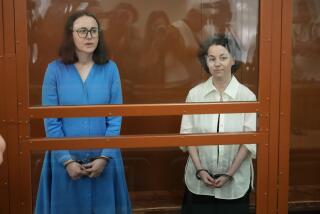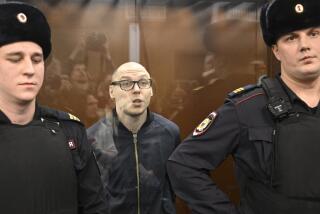Russian Acquitted of Stirring Up Anti-Semitism
- Share via
ST. PETERSBURG, Russia — After waiting more than two months in jail for his day in court, a philosophy professor was acquitted Monday of charges that he sought to stir up anti-Semitism by selling copies of “Mein Kampf.”
Viktor Bezverkhy, 63, was arrested in December for photocopying and hawking 300 copies of Adolf Hitler’s autobiographical manifesto on Nevsky Prospect, St. Petersburg’s main street. He was charged under an article of the Russian Criminal Code that outlaws the fanning of “anti-Semitic, racist or ethnic” hatred.
Bezverkhy, founder of a fascist group in this city, maintained that he published the book to make money.
The public prosecutor here--frightened by the growing appeal of fascism as Russia’s economy deteriorates--has begun to interpret the law to mean that extreme anti-Semitic literature should not be distributed at all.
The prosecutor’s office has compiled a list of 15 forbidden books, including “Mein Kampf,” Joseph Goebbels’ “Theory and Practice of Bolshevism” and Richard Wagner’s “Judaism in Music.”
Bezverkhy’s trial, which started last Wednesday, was a circus. The courtroom was packed daily with a volatile mix of fascists, Jews, journalists and the merely curious. Supporters booed, hissed and discussed loudly the ethnic origins of both judge and prosecutor.
The prosecution had sought an 18-month suspended sentence. But Judge Ivan Pochechuyev ruled: “Printing the book cannot be considered as a direct appeal for race-based hostility, and it was not proved that the printing was followed by any acts of racial hate.”
Prosecutor Valery Dolgov called the acquittal “a kick in the teeth for those people in this city who survived World War II.” He and his team vowed to appeal.
The prosecutor’s blacklist, however, has stirred up tensions of its own. Some St. Petersburg residents say they are upset that officials are again dictating what people can and cannot read.
“I, of course, don’t much like it,” said Yuri Vdovin, chairman of the City Council’s committee for glasnost (openness) and freedom of the press. “I am a believer in the idea that no book should be forbidden. In a free discourse, these fascists would be taken much less seriously and would be receiving much less attention.”
More to Read
Sign up for Essential California
The most important California stories and recommendations in your inbox every morning.
You may occasionally receive promotional content from the Los Angeles Times.










